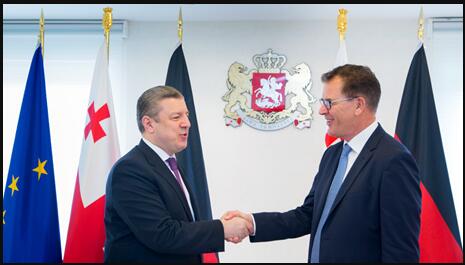The focus of international support – supported by the IMF – in the implementation of the State Program on Poverty Reduction and Economic Development 2003-2005 (strategy paper 2003) was the expansion of the energy sector (over 80% of all investments), economic reforms, poverty reduction, and health and education.
Since Georgia’s independence until 2008, the EU Commission alone financed development cooperation projects to the tune of 500 million euros. Together with funds from the EU member states, European support for Georgia has been around EUR 1 billion since 1992. At the international donor conference in Brussels in October 2008, the EU Commission pledged a further EUR 500 million for humanitarian aid and reconstruction.
On November 14, 2006, the EU and Georgia (at the same time as Armenia and Azerbaijan) signed the European Neighborhood Policy Action Plan (ENPI – Info Center Georgia). The plan regulates future cooperation with the EU. The ten priorities for action include pacifying the conflict regions of Abkhazia and South Ossetia, strengthening democracy and the rule of law, and fighting corruption. Under the ENPI agreement 2007-2013, 120.4 million (Armenia 98.4 million) were earmarked for Georgia. The instrument was supplemented by the “Eastern Partnership” (May 7, 2009, Prague), within the framework of which the funds for the European Neighborhood Policy for six successor states of the USSR (Armenia, Azerbaijan, Georgia, Moldova, Ukraine, Belarus) were doubled. With the signing of the Association Agreement between the EU and Georgia. The cooperation deepened in 2014. The agreement contains, among other things, provisions on economic, political and legal issues and entered into full force in July 2016 with the adoption of the relevant agenda. The most important points are: 1. Promotion of common values and principles: focus on democracy, equality, market economy and sustainable development 2. Foreign and security policy, conflict prevention and crisis management 3. Justice and freedom: fight against corruption, data protection and protection of human rights 4. Cooperation in another 28 areas, including education, Health, Tourism, Agriculture and Research 5. Deep and Comprehensive Free Trade Area (DCFTA): As part of the AA, the DCFTA aims to further strengthen trade relations between Georgia and the EU. The free trade area does not extend over the provinces of Abkhazia and South Ossetia. Georgian and EU regulations in areas such as public tenders, agriculture and e-commerce are to be further aligned. For the implementation of the DCFTA, Georgia has drawn up an action plan until 2017, the implementation of which is on the side of the European Georgia Business Councilor the EU representation in Georgia can be traced. At the end of November 2018, renewed financial support from the EU to Georgia in the amount of EUR 231 million for various projects was contractually agreed in Brussels. According to the Georgian Foreign Ministry, the agreements provide for an allocation of 97 million euros to implement the priorities of the Association Agreement agenda. For the agreements of the “On Skills Development and Matching for Labor Market Needs” program, EUR 48.85 million and EUR 47.65 million for the “On Economic and Business Development in Georgia” agreements are earmarked. The focus of the program is on: ensuring a quick and fair settlement of trade disputes, modernizing the financial infrastructure and facilitating business developments. As part of the SSF Action Plan for 2018, € 134 million is earmarked for Georgia. Around 55 million euros of this will be allocated to investment and infrastructure projects under the EU Neighborhood Investment Facility (NIF), while the remaining 79 million euros will be allocated to the following areas: economic management and tax policy (18.6 million euros), security and Rule of law (EUR 27 million), support for the implementation of the Association Agreement (EUR 33.5 million).
According to extrareference, Germany is one of the most important partners for Georgia. Since 1992, the country has been supported with over 1.066 billion euros. At the same time, Germany is Georgia’s largest trading partner in the EU. Around 230 German companies are currently active in Georgia, 130 of which are part of the German Business Association Georgia (Deutsche Wirtschaftsvereinigung Georgien), which has been active since 2007 that regularly disseminates current information on the economic situation. The bilateral trade turnover in both countries rose in 2010 to a total of EUR 302 million. In the period from January to August 2011, German exports to Georgia increased by 24 percent, and German imports from Georgia by as much as 179 percent. In 2016, goods worth around USD 85.4 million were imported from Georgia and around USD 420 million were exported. Current data can be found on the website of the Georgian Statistics Committee.
As part of the 2001 launched Caucasus initiative of Germany particularly the development and expansion of the legal system, strengthen local democracy, the energy sector, the private sector, the TB-control and protection of bioreserves conservation Caucasus supports (BMZ Georgia). In December 2011, Federal Minister Rösler met with the Georgian Prime Minister and promised an expansion of cooperation. He named the future-oriented fields: the modernization of Georgian agriculture as well as the areas of energy efficiency and renewable energies. In the government negotiations in September 2015, development projects with a volume of 156.3 million euros were agreed (117.5 million as a loan. During the German-Georgian government negotiations in September 2015, development projects with a total volume of up to 156.3 million euros were agreed The largest part (up to 117.5 million euros) is made available as a loan. During the talks with Federal Development Minister Dr. Gerd MüllerIn May 2017, an agreement was reached with Prime Minister Georgi Kvirikashvili to intensify cooperation, particularly in the education sector. The minister launched the new program “Private Sector Development and Vocational Training South Caucasus”. Together with German companies, young women and men are trained in skilled trades, including drywall construction, as painters, cleaners, welders and electricians. Germany wants to participate in offering young people in Georgia professional prospects in their home country.
